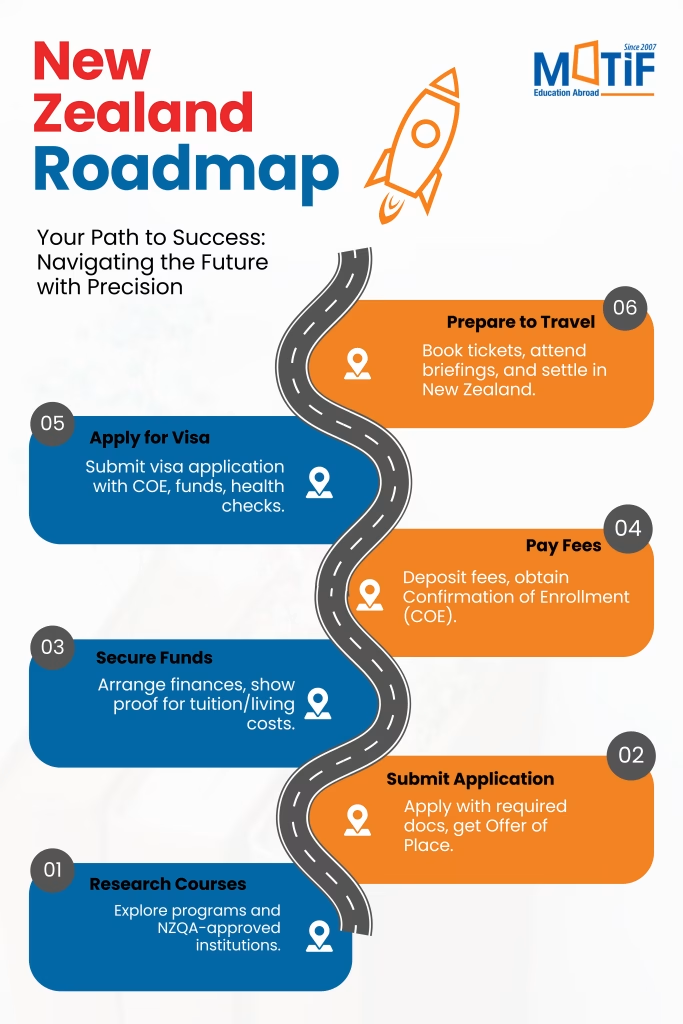Introduction
Many students in Nepal dream of studying abroad. They want world-class education and better opportunities.
One exciting option is to study in New Zealand from Nepal. New Zealand offers top universities, beautiful landscapes, and a welcoming environment. It is becoming a popular choice for Nepalese students.
Why should you consider New Zealand? The country has excellent schools, like the University of Auckland.
These schools are known for quality teaching and modern programs. You can study courses that match your goals. New Zealand also provides scholarships to help with costs.

Key Takeaways
- New Zealand schools teach real-world skills. Students can work for 3 years after school.
- Schools here cost less than in the US or UK. Some scholarships give free money to students.
- New Zealand is safe. Students get help and feel at home.
- Students love the beautiful outdoors and adventures. They have fun while working hard in school.
New Zealand has beautiful nature with mountains, beaches, and green areas.
Students from Nepal feel comfortable living there.
The country is safe, and the locals are friendly to international students.
There are services to help students adjust. After studying, students can get a work visa to stay and get job experience.
New Zealand offers a variety of benefits. Good education, fun activities, and career chances for a better future are some of it.
Why Choose New Zealand for Higher Education?
New Zealand is not just about studies. It has stunning nature. Think of mountains, beaches, and green fields. You can explore these places during your free time. For students from Nepal, this feels like a second home.
The country is safe and friendly too. People here welcome international students. There are support services to help you adjust. After finishing your studies, you can work in New Zealand. A post-study visa lets you stay and gain experience. This helps you build a strong career.
If you dream of a bright future, New Zealand is the place for you. It offers education, adventure, and opportunities.
World Class University
New Zealand has some of the best universities in the world. These schools are known globally for their quality.
Here are the Top 8 Universities (Global Ranking):
| University ( Ranked ) | Fees | Course |
|---|---|---|
| University of Auckland Rank # 68 | NZD 75,000 - 85,000 per annum | Psychology, Medicine, Engineering of Chemical, Civil, Electrical, Mechanical, Law, |
| University of Otago Rank: #206 | NZD 70,000 - 80,000 per annum | Biomedical Sciences, Health Sciences of Medicine, Dentistry, Pharmacy, Business Studies, Physical Education and Sports Science |
| Victoria University of Wellington Rank: #241 | NZD 16,250 - 67,950 per annum | Arts, humanities, and community services. Business, IT, cyber security & data science, Education & early childhood, Engineering, science & built environment, English & preparation programs, Health, biomedicine & nursing. Hospitality, tourism & events. |
| University of Canterbury Rank: #256 | NZD 20,600 - 88,000 per annum | Civil Engineering, Geography, Linguistics
, Agriculture & Forestry , Earth & Marine Sciences, Geology, Geophysics, Political & International Studies |
| University of Waikato Rank: #250 | NZD 25,000 - 30,000 per annum | Engineering of Software, Mechanical, Electronic, Computer Science, Law, Social Sciences and , Education |
| Massey University Rank: #239 | NZD 20,000 - 30,000 per annum | Engineering of Mechanical, Electrical, Civil, Business Administration, Veterinary Science, Communication and Media Studies |
| Auckland University of Technology Rank: #407 | NZD 25,000 - 35,000 per annum | Medicine, Law, Psychology, Engineering of Chemical, Civil, Electrical, Mechanical |
| Lincoln University Rank: #362 | NZD 25,000 - 35,000 per annum | Environmental Science, Landscape Architecture, Agriculture and Agribusiness, Food Science and Technology |
Universities there offer
Quality of education
New Zealand’s education system is excellent and innovative. The country makes sure all schools meet high teaching standards. Whether you study for a bachelor’s, master’s, or vocational training, the courses are practical and forward-thinking.
Safe and Welcoming Environment
One key feature is hands-on learning. Many programs include internships, industry placements, and real-world projects. This helps students gain experience before they graduate. It also makes them more employable.
New Zealand schools focus on critical thinking, creativity, and problem-solving. These skills are important in today’s job market. For Nepalese students, this means an education that prepares them for success.

Cultural Diversity
New Zealand is full of different cultures. It is a great place for Nepalese students who want a multicultural experience. The country values diversity and encourages students to celebrate their identities.
Universities in New Zealand care about international students. They offer support services and healthcare. For Nepalese students, this means peace of mind. They know they will be looked after.
New Zealand’s small population helps create close communities. Students can easily make friends and connections. People in New Zealand are warm and eager to help.
Benefits of Studying in New Zealand for Nepalese Students

Affordable Education
New Zealand is cheaper than countries like the US, UK, or Australia. Tuition fees for most undergraduate degrees range from NZD 35,000 to NZD 45,000 per year. This is much lower than in other popular study destinations.
Living costs are also manageable. Smaller cities like Dunedin or Palmerston North are cheaper than Auckland. On average, students spend around NZD 15,000 to NZD 20,000 per year on housing, food, transport, and other needs. For Nepalese students, this makes New Zealand a good choice without losing quality.
Scholarships and Financial Aid
New Zealand offers scholarships for international students, including those from Nepal. One example is the New Zealand Commonwealth Scholarship. It covers tuition, travel, and living costs.
Other scholarships, like the University of Auckland International Student Excellence Scholarship , give partial or full funding based on grades. Many schools also offer part-time jobs on campus. This helps students earn money while gaining work experience.
Scenic Beauty and Lifestyle
New Zealand is famous for its natural beauty. It has green hills, clean beaches, snowy mountains, and hot springs. Adventure lovers can enjoy hiking, skiing, bungee jumping, and whale watching.
The mix of nature and outdoor fun makes New Zealand perfect for students who value balance. After classes or exams, students can relax by exploring parks, lakes, or trails. For Nepalese students used to the Himalayas, New Zealand’s landscapes feel familiar and exciting.
Now, Let’s see how you can start your journey today.
Post-Study Work Opportunities
After graduation, students can stay in New Zealand to work. A post-study visa lets them stay for up to three years. During this time, they can get work experience, build networks, and even apply for permanent residency.
This is helpful for Nepalese students who want to start careers globally. Industries like IT, healthcare, engineering, and hospitality need skilled workers. Graduates have many job options.

Exploring Your Study Options in New Zealand
Find the Right University
New Zealand has some of the best universities in the world. These schools offer high-quality education. For example:
- The University of Auckland is great for engineering, business, and health studies
- The University of Otago is well-known for its medical courses
- Victoria University of Wellington is strong in law, arts, and creative subjects
These universities have modern equipment, skilled teachers, and good connections worldwide. They help students do well in their studies and future careers.
Choose Your Field of Study
Think about what you want to study. Do you like science, business, or the arts? New Zealand offers programs in many fields. Some popular/demanded areas include:
- Engineering – Civil, Electrical, Mechanical, and Software Engineers.
- Construction & Trades – Electricians, Plumbers, Surveyors.
- IT & Cybersecurity – Software Developers, AI Specialists, IT Analysts.
- Education – Teachers (Primary and Secondary).
- Agriculture & Farming – Agronomists, Horticulturists.
- Healthcare & Nursing – Nurses, Doctors, Aged Care Workers
Pick a field that matches your interests and career goals.
Check Course Details
Once you know your field, look at the courses offered. Pay attention to:
- How long the course lasts (e.g., 3 years for undergraduate degrees).
- Entry rules (like academic records and English test scores).
- Tuition fees and living costs.
Websites like StudyinNewZealand.govt.nz and university portals help find this information.
Check Course Details
Speaking with current students or alumni can give you useful insights. They can tell you about:
- Campus life
- Teaching quality
- Job opportunities after graduation
You can connect with them through online forums or social media.
Consider Location
New Zealand has many cities where you can study. Each city has its own vibe:
- Auckland: Big and lively, with lots of job opportunities.
- Dunedin: Smaller and quieter, perfect for focusing on studies.
- Wellington: Known for arts and culture.
Choose a city that suits your lifestyle.
Look for Scholarships
Studying abroad can be expensive, but scholarships can help. New Zealand offers many scholarships for international students. Examples include:
- New Zealand Commonwealth Scholarship: Covers tuition, travel, and living costs.
- University-specific scholarships are based on grades or talents.
Check these options to reduce your expenses.
Plan for Life After Study
New Zealand allows students to work after graduation. A post-study visa lets you stay for up to three years. During this time, you can:
- Gain work experience
- Build professional networks
- Apply for permanent residency

What Documents Do I Need to Apply to Universities in New Zealand?
Applying to universities in New Zealand requires some important documents. Preparing these early helps avoid stress. Here’s a list of what you need:
Academic Transcripts
You need your academic transcripts. These show your grades from high school or university. For undergraduate programs, include your high school results. For postgraduate programs, include your bachelor’s degree results. Make sure your transcripts are official and up-to-date.
English Test Scores
Most universities ask for proof of English skills. You can take tests like IELTS, TOEFL, or PTE. A minimum IELTS score of 6.0–6.5 is common. Check the exact score required by your chosen university. If your score is lower, you may need to improve it before applying.
Statement of Purpose (SOP)
A Statement of Purpose (SOP) is very important. It tells the university about you. Write about:
- Your background and education.
- Why do you want to study in New Zealand?
- Your career goals.
Make your SOP personal and honest. Tailor it for each university to show why you’re a good fit.
Recommendation Letters
You need recommendation letters. These come from teachers, professors, or employers. They should talk about:
- Your skills and strengths.
- Why you’re a good candidate for the program.
Ask for these letters early. Give your recommenders enough time to write them.
Resume or CV
Include a resume or CV with your application. Highlight:
- Your education and work experience (if any).
- Extracurricular activities or achievements.
Keep your resume simple and organized. Focus on relevant details.
Passport Copy
You also need a copy of your passport. Make sure it’s valid and clear. This proves your identity during the application process.
Other Documents
Some programs may ask for extra documents. Examples include:
- Portfolios for creative arts programs.
- Work samples for professional courses.
Check the university’s website to see if you need anything else.
Step-by-Step Guide to Studying in New Zealand from Nepal
Studying abroad is a big step, but planning makes it easier. Here’s how to study in New Zealand from Nepal.
Step 1: Research Universities and Courses
Find universities and courses that match your goals:
- Pick Your Field: Choose what to study – engineering, business, medicine, or arts
- Check Programs: Auckland engineering or business, Otago (medicine), Wellington (law/arts)
- Review Details: Course length, requirements, fees (NZD 35,000-45,000 yearly)
- Get Advice: Talk to current students
Good research helps you succeed.
Step 2: Meet Admission Requirements
Check what you need to get into your program:
- School Records: High school certificates for first degrees, bachelor’s degree for higher studies
- English Tests: IELTS (6.0-6.5), TOEFL, or PTE scores needed
- Other Papers: Personal statement, reference letters, resume showing your experience
Start early and check each school’s rules carefully.
Step 3: Apply to Universities
After collecting your papers, send your application:
- Apply Online or Use Help: Apply on the university website or use an agent for assistance
- Write a Good Personal Statement: Make it unique for each school, show your goals and why you chose New Zealand
- Check Everything: Make sure all papers are complete and keep copies
After sending, wait for the school’s answer. If accepted, you’ll get an offer letter for your visa.
Step 4: Apply for a Student Visa
After getting your offer letter, apply for a student visa:
- Fill Form: Complete application on Immigration New Zealand website
- Send Papers: Offer letter, bank statements, health insurance, passport
- Pay Fee: NZD 375 online
- Apply Early: Submit 2-3 months before travel
Once approved, you can start studying.
Step 5: Plan Your Finances
Plan your money for studying:
- Approved Banks: NABIL Bank, Nepal SBI Bank, Standard Chartered Bank Nepal
- Budget: School fees (NZD 35,000-45,000 yearly), living costs (NZD 15,000-20,000 yearly)
- Get Help: Look for scholarships and university funding
- Work Part-Time: Work up to 20 hours weekly while studying
Good planning helps with money.
Step 6: Prepare for Departure
Get ready before leaving Nepal:
- Pack: Warm clothes, medicines, important papers (passport, visa, offer letter)
- Learn: Study local customs and practice English
- Join Welcome Programs: Attend orientation when you arrive
Good preparation helps.
Challenges Faced by Nepalese Students in New Zealand
Studying abroad is exciting, but it also comes with challenges. Here are some common problems Nepalese students face in New Zealand—and how to solve them.
Cultural Adjustment
Adapting to a new culture can feel hard at first. Everything might seem different—from food to festivals. To make the transition easier:
- Learn about New Zealand’s traditions and customs before you go.
- Join cultural clubs or groups at your university.
- Talk to other international students who have been through the same experience.
- Be open-minded and willing to try new things.
Remember, adjusting takes time. Don’t worry if it doesn’t happen right away.
Homesickness
Missing home is normal when you’re far away. To feel better:
- Stay connected with family and friends back in Nepal through video calls and messages.
- Bring small reminders of home, like photos or favorite snacks.
- Build a support network in New Zealand by making friends with classmates or roommates.
- Keep yourself busy with activities you enjoy, like sports or hobbies.
Homesickness fades as you settle into your new life.
Financial Constraints
Money can be a big worry for students. Here’s how to manage:
- Create a budget. Write down all your expenses, like rent, food, and transportation.
- Look for scholarships or grants to reduce costs.
- Find part-time work on campus. Many universities offer jobs that fit your study schedule.
- Avoid unnecessary spending. Stick to your budget and save money where you can.
Planning helps you stay financially stable.
Academic Pressure
Balancing studies and other activities can be tough. To handle the pressure:
- Make a timetable for your tasks. Prioritize important assignments and exams.
- Break big tasks into smaller steps so they feel less overwhelming.
- Ask for help if you need it. Professors, counselors, and classmates are there to support you.
- Take breaks to relax and recharge. Don’t forget to take care of yourself.
With good planning and support, you can succeed academically.
Tips for Thriving as a Nepalese Student in New Zealand
Here are simple tips to help you thrive in New Zealand:
- Join Student Communities and Networks: Being part of a group helps you make friends and feel included. Look for Nepalese student associations or international clubs.
- Explore Internships and Job Opportunities Early: Start looking for internships during your first year. This gives you valuable experience and improves your resume.
- Embrace the Local Culture While Staying True to Your Roots: Try new foods, attend local events, and learn about New Zealand’s history. At the same time, celebrate festivals like Dashain and Tihar to stay connected to your culture.
Stay Organized with Finances and Academic Deadlines: Use apps or notebooks to track your money and assignments. Being organized reduces stress and keeps you on track.
Study in Australia from Nepal - Contact Us Today!

Conclusion
Studying in New Zealand offers amazing benefits—world-class education, affordable costs, and stunning landscapes. It’s a chance to grow personally and professionally while exploring a beautiful country. For Nepalese students, this journey opens doors to endless opportunities.
Are you ready to transform your future? Start planning your journey to New Zealand today!
Additional Resources
Here are helpful links to guide you:
- Official Website: StudyinNewZealand.govt.nz
- IELTS Preparation Guide: IELTS.org
- Cost Calculator Tool: Sorted.org.nz
- Scholarship Listings: Check university websites for updates.
Use these resources to prepare for your adventure in New Zealand.
Frequently Asked Questions(FAQs)
Some of the best universities include:
- University of Auckland: Known for engineering, business, and health sciences.
- University of Otago: This university is famous for its medical programs.
Victoria University of Wellington: Great for law, humanities, and creative arts.
To get a student visa:
- Complete the online application form.
- Provide proof of enrollment, financial stability, and health insurance.
- Pay the fee (about NZD 370 ).
- Apply at least 2–3 months before leaving Nepal.
Studying in New Zealand costs money, but it’s affordable compared to other countries. Tuition fees range from NZD 22,000 to NZD 35,000 per year, depending on the program. Living costs are about NZD 15,000 to NZD 20,000 annually. This includes rent, food, transportation, and other expenses. Smaller cities like Dunedin or Palmerston North are cheaper than Auckland.
Yes, there are many scholarships for Nepalese students. The New Zealand Commonwealth Scholarship covers tuition, travel, and living costs. Universities also offer merit-based scholarships for international students. For example, the University of Auckland International Student Excellence Scholarship gives partial or full funding. These scholarships help reduce financial stress while studying abroad.
Yes, you can work part-time while studying in New Zealand. International students can work up to 20 hours per week during the semester. During holidays, you can work full-time. On-campus jobs are a good option because they are convenient and flexible. Part-time work helps you earn money and gain work experience.
New Zealand has some of the best universities in the world. The University of Auckland is known for engineering, business, and health sciences. The University of Otago excels in medical programs. Victoria University of Wellington is great for law, humanities, and creative arts. These universities offer high-quality education and support for international students.
To get a student visa, you need to follow a few steps. First, complete the online application form on the Immigration New Zealand website. Then, provide proof of enrollment, financial stability, and health insurance. You also need passport-sized photos and a valid passport. The visa fee is about NZD 370. Apply at least 2–3 months before leaving Nepal.
Yes, you can stay in New Zealand after graduation. The country offers a post-study work visa that lets you stay for up to three years. During this time, you can work and gain international experience. You can also build professional networks and apply for permanent residency. This is a great opportunity for Nepalese students to grow their careers.
Yes, New Zealand is very safe for international students. It has low crime rates and friendly locals. Universities provide support services like counseling and healthcare. The country’s small population fosters close communities where students feel included. Nepalese students can feel at home in New Zealand’s welcoming environment.
Choosing the right course is important for your success. Think about your interests and career goals. Research programs in fields like engineering, business, or medicine. Check details like course length, entry rules, and fees. Websites like StudyinNewZealand.govt.nz and university portals can help. Talk to alumni or current students for advice.
Life in New Zealand is exciting and balanced for students. The country has stunning landscapes, like mountains and beaches. You can enjoy outdoor activities like hiking and skiing. Universities have a multicultural environment where students from different backgrounds connect. There are also cultural festivals and clubs to join. Nepalese students often find New Zealand both familiar and inspiring.
